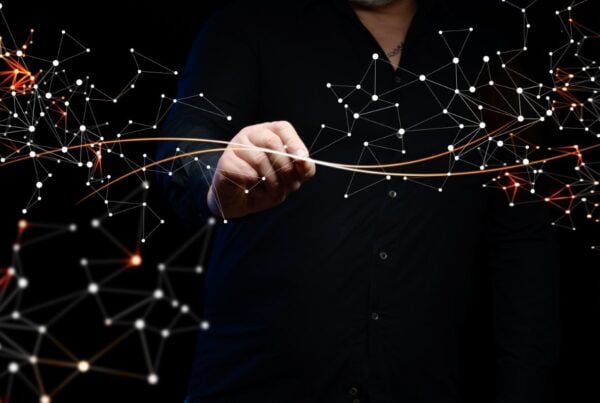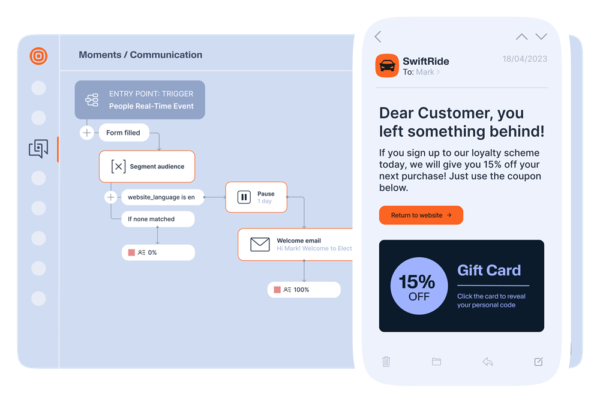Last week the newest addition to the smartphone market, the Blackphone started shipping to security conscious consumers – the initial stock was quickly sold out.
The phone trades on its advanced security features, with a customised Android operating system and a suite of privacy-optimised software including encrypted VoIP; ‘Silent Text’, for secure messaging; and ‘Silent Contacts’, for an encrypted contact list that other apps can’t access.
Here we’ve asked for views from MEF members and the wider mobile industry on the smartphone market’s latest entrant and why mobile privacy is such a big deal.
The issue of consumer trust remains business critical, being identified as the single biggest barrier to greater adoption of mobile services in the recent MEF Global Trust Report.
Consumer Trust also has its own Meffys award category this year, recognising the efforts of companies paving the way to create a more trusted environment and experience on mobile for consumers.
Submissions for the Meffys are open until July 25th
Yuval Ben-Itzhak
CTO
AVG Technologies


Yuval Ben-Itzhak, Chief Technology Officer, AVG Technologies
As the connected world is driven by data (big data), privacy has become a main concern. In other words, privacy in the connected world is almost equivalent to malware in the PC world. It is a raising concern by consumers as they step into the IoT world (Internet of Things).
The connected world is about consumer data, less about the device you use to connect. In the IoT world, devices and sensors will create more data about you than you will post online. The online data is not in the consumer control and is subject to local law, based on where it is stored. As the Internet is global but the privacy law is local, the way the personal data is used/shared/sold/retained is a big threat to consumer privacy
There is nothing wrong with data driven business models. If, and only if, they are made with user consent, allowing a control to decide on sharing/retention/sell and following the privacy law. More specifically, data collected about children.
Technology runs faster than law. There are great initiatives and laws, however more work is needed – more specifically having the IoT world just around the corner.
Allen Scott
MD, UK & Ireland
F-Secure



Allen Scott, Managing Director UK & Ireland, F-Secure
This is a great idea and definitely a move in the right direction. Privacy is climbing people’s personal agendas and Blackphone will meet the demands of the most security conscious.
In the last year (since the Snowden revelations), people have become more aware of their digital privacy and, more importantly, how it is being breached by governments, hackers and even marketers tracking their behaviour. Without adequate protection from government legislation, people are having to take privacy into their own hands. It is the threat of the unknown that is the most worrying.
It shouldn’t be this way and law-makers need to take bigger steps to shape the freedom of the Internet. In general terms, we are still in the infancy of the Internet, so now is the time to set boundaries and educate people. It would be unacceptable for any organisation to put hidden cameras into a person’s house to monitor their activity, so it shouldn’t be acceptable on their mobile devices either.
The one thing I would say though is that the price of this phone ($629) may be prohibitive to some and it is possible to get the same degree of encryption and privacy on a device by using a VPN and secure messaging app which will be significantly cheaper.
Daniel Preiskel
Senior Partner
Lyda Mastrantonio
Associate
PREISKEL & CO
Daniel Preiskel & Lyda Mastrantonio, PREISKEL & CO
The freemium business model adopted by apps businesses has led to a society, where mobile apps follow users everywhere allowing them to enjoy innovative services for little or no monetary cost in exchange of their data.
Personal data and other confidential information is often put at risk in this approach and can be used for controversial purposes both by private companies and government agencies, as well as being open to security threats, such as interception by third parties.
The extent of consumer perception as to the privacy risks they face in using the multitude of apps is unclear, as is whether they are prepared to pay a premium for expensive privacy-conscious technology, and ditch their favoured devices and apps.
Nevertheless, it would appear that there has been a steady increase in consumer concern on the use being made of their personal data, due to the reporting of events such as PRISM, various cyber-threats and the rise of big data business. Whilst the Blackphone should therefore be music to the ears of those concerned by privacy, it should also be hugely interesting to businesses who are struggling to implement effective BYOD (Bring Your Own Device) policies.
The Blackphone is therefore hugely welcome, especially as its mere promotion will highlight current privacy related concerns in the mobile ecosystem. To what extent consumers and businesses will be prepared to pay for the additional security in terms of money and the foregoing of their favoured devices or apps, will be intriguing.
Rich Qiu
VP of Business Development, Mobile
TRUSTe



Rich Qiu, VP of Business Development, Mobile, TRUSTe
Blackphone enters at a time when consumers are both concerned about mobile devices and aware that they have the ability to make choices to protect their personal information. Our research shows that lack of trust has significant business implications – 79% of consumers will not download an app they don’t trust and nearly 1 in 4 will not share any information with mobile apps.
Consumers are becoming more savvy about their interaction with technology, and believe that they are ultimately responsible for managing their privacy and are looking more closely at how companies protect their personal information.
Blackphone is a step in the right direction – it helps consumers protect their information and builds upon the innovative nature of the tech industry to produce a smartphone for the Internet of Things era that puts privacy first.
In order for the Blackphone to thrive, the apps market will need to keep pace as it offers apps at a freemium hoping consumers share their information in exchange for for value-added services. Today’s consumers are more aware of privacy policies and monitoring how their information is being used.
Just as technology affects consumer behaviors, it also impacts privacy legislation but this legislation often lags behind the technology industry. Regulators need to collaborate with the industry to help legislation evolve as data becomes the currency of the Internet of Things era and technology innovations enable businesses to use this information for commercial purposes.
Senior Director, Consumer Marketing & Creative
Ghostery


Jib Hunt, Senior Director, Consumer Marketing & Creative, Ghostery
Consumers should certainly be concerned with the privacy of their mobile devices. Mobile devices are continuing to store more and more sensitive user data. They are also used more frequently than PC’s and have become a staple of daily living.
The threat to mobile users is that their sensitive data is stored on their devices such as emails, calendars, contact information, and passwords. Another major vulnerability is the increase in mobile commerce where users purchase goods and applications over wireless networks, process point-of-sale payments, conduct online banking, and even make payments at cash registers.
Free mobile apps are trying to collect some type of user data. My colleague Andy Kahl, Senior Director of Transparency at Ghostery, sums it up best when he often says, “if the product is free, you are the product”.
There still is much more work to be done with the privacy legislations to help protect consumer privacy. Companies like Silent Circle and the new Blackphone are ways to help protect a users privacy in the meantime. We at Ghostery think that the Blackphone is a forward thinking privacy device and we hope to align ourselves with them in the near future.
Paul Steiner
MD, EMEA
Accellion
Paul Steiner, Managing Director, EMEA, Accellion
Coming from a company with a BYOD policy, its encouraging to see a new phone coming out that IT teams won’t worry about in terms of it being used within an organisation, since it will keep both business and personal data much more secure. However, the standardisation of the Blackphone’s software is difficult to see as a positive move.
As soon as a new ‘must-have’ feature in Android is developed, the Blackphone will begin to fall behind. How long will its customers be willing to wait for the Blackphone to incorporate these features? At the same time, other Android devices will quickly catch up on security features as users simply won’t want to wait any longer than they have to. A good example of this is Samsungs KNOX platform.
Rhys Williams
Partner
Taylor Vinters
Rhys Williams, Partner, Taylor Vinters
Although the recent NSA hacking revelations have obtained the most press coverage, the Blackphone does not claim to be “NSA proof”. If a sophisticated intelligence organisation wishes to hack your phone, it will do so.
There may however be other, more commercial, reasons why someone might wish to infringe your privacy, for example for targeted mobile marketing (in relation to which, of course, the UK already has detailed laws).
Organisations may however also wish to track mobile device movement for more altruistic reasons: for example, applying statistical analysis to anonymised, aggregated movement data may enable shopping malls and other large public space operators to make better-informed business or planning decisions.
The laws on privacy are continuing to evolve and develop. So even where we already have laws, new laws will continue to be passed to deal with real or perceived threats to individual rights of privacy. In 2015, for example, we can expect to see a new Data Protection Regulation from the European Commission. We have already recently had the incredibly flawed ECJ judgment on the “right to be forgotten”, in which a Spanish man, Mario Costeja González, ensured that half the modern world would know that he wanted nobody to know about his house being repossessed in 1998.
Sudhi Herle
SVP & GM Mobile Solutions
Zscaler
Sudhi Herle, SVP & GM, Mobile Solutions, Zscaler
The Blackphone builds upon recent anti-wiretapping sentiment and marks the first of many such products focused on safe guarding user privacy. While lacking in traditional Google ecosystem apps, the KitKat derived “PrivatOS” comes with a suite of VPN, encrypted cloud storage and secure communication applications. While these services are provided by one or more 3rd party providers, what makes the Blackphone attractive is the bundled 2 year service for these secure app suite.
The selling point here is that the apps in question are carefully selected and vetted by a team of extremely reputable cryptographers and security experts. In addition, at the Android platform level, PrivatOS comes with a central place to manage the individual security settings of each app – giving the end user precise & fine grained control over what data and hardware is accessed by each app.
The Blackphone and PrivatOS are aimed squarely at people interested in preserving end-to-end communications privacy. Many governments in Europe and US are taking measured steps to protect user privacy. While this is a laudable first step, in an age when cloud based services transcend national and regional boundaries, the issue of what data is “private” seems murky at best. An end-to-end secure communications suite ensures that user data is always in an encrypted form while outside the user’s devices.
The privacy and security aspects of the Blackphone decidedly appeal to Government customers. It remains to be seen if security & privacy becomes the dominant purchasing factor for a large majority of cell phone users.
Brandon Ackroyd
Head of Customer Insight
TigerMobiles
Brandon Ackroyd, Head of Customer Insight, TigerMobiles
Are consumers really concerned about privacy on their mobile device – and if yes, will they do anything about it?
The answer is yes, consumers have some concerns about privacy but those concerns aren’t enough to change their buying habits or switch allegiance from one of the ecosystems to Blackphone. Consumers get concerned when security breaches are brought up in the mainstream media, but that soon dies down and so do their fears. They’re nothing more than a passing thought.
We run a large FAQ section on our site that get’s anywhere between 20-100 questions per day, I’m working on that area on a daily basis and I can say with confidence less than 1% of questions relate to privacy. It’s just not something high on the priority list – getting more out a smartphone battery and finding new apps to play with are rightly or wrongly way higher on the priority list of the average consumer.
I think the best way of looking at it is like this – if enough consumers cared majorly about privacy enough to lock themselves out of iOS and Android ecosystems then BlackBerry would still be ruling the world of smartphones. Instead they’re struggling to make any sort of notable sales and their market share is decreasing quarter on quarter. They have an ultra secure ecosystem backed by Governments across the world, but their phones don’t appeal in a world where materialism trumps security.
The only way I see Blackphone succeeding in the mainstream is a.) a huge security breech effecting Android and iOS like we’ve never seen before that really does some form of lasting damage. or b.) The Blackphone technology gets adopted by the main ecosystems. In its current form Blackphone is only going to appeal to that small segment of users who are ultra paranoid about privacy, to everyone else they’d rather have a shiny new iPhone like their friends have.
If you would like to contribute a comment to this article contact us at editorial@mefmobile.org or leave your thoughts in the replies below






This piece of writing will assist the internet viewers for creating new blog or
even a blog from start to end.